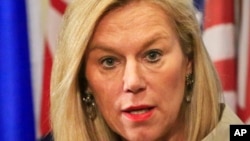A United Nations envoy urged Lebanon's feuding political leaders to pick a new president, warning on Monday that the country's year-long power vacuum had undermined its ability to deal with the impact of the Syrian crisis and a host of other problems.
The Middle East's only Christian presidency has been vacant since May 2014 because lawmakers cannot agree on a candidate.
Lebanese politics has long been dogged by sectarian divisions and personal rivalries but the war next door has exacerbated divisions even further.
"I urge Lebanon's leaders ... to put national interests above partisan politics for the sake of Lebanon's stability, and to show the flexibility and sense of urgency needed to resolve this issue," U.N. Special Coordinator for Lebanon Sigrid Kaag said in a statement marking one year without a president.
She said the vacuum had hindered the country's ability to tackle growing security, economic and social problems.
"It has contributed to political polarization at a time when Lebanon must make a united effort to safeguard the country from the impact of the Syrian crisis," she said.
The presidency has fallen victim to political deadlock rooted in Lebanese rivalries that have been complicated by competition between regional states, notably Iran and Saudi Arabia, which have a decisive influence over Lebanese politics.
A government formed in February with Saudi-Iranian blessing has spared Lebanon a complete political void at the top but it has struggled to take decisions and the parliament is barely functioning.
The country is hosting more than one million refugees from Syria's war which have put a strain on its already dilapidated infrastructure.
Fighting over the border has regularly spilled over onto Lebanese soil and Sunni Islamist militant groups have tried to use Lebanese towns as bases and have held Lebanese soldiers captive, killing a number of them.





